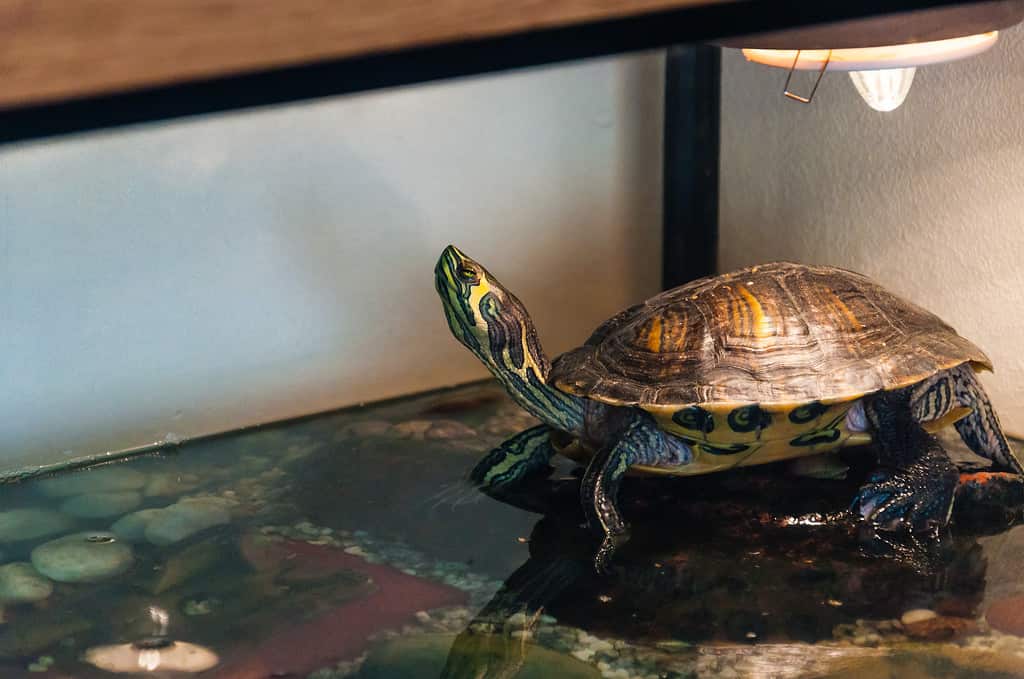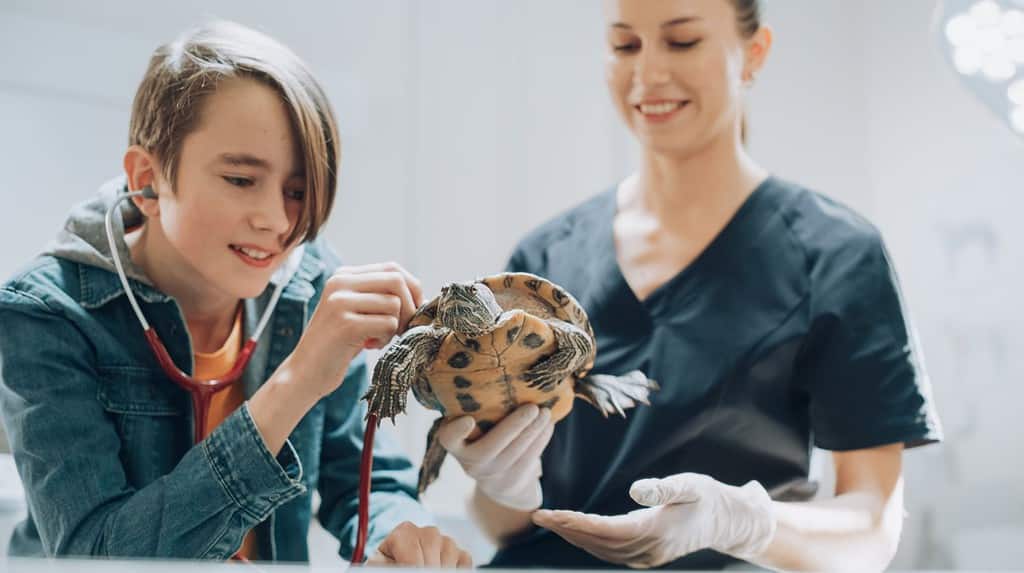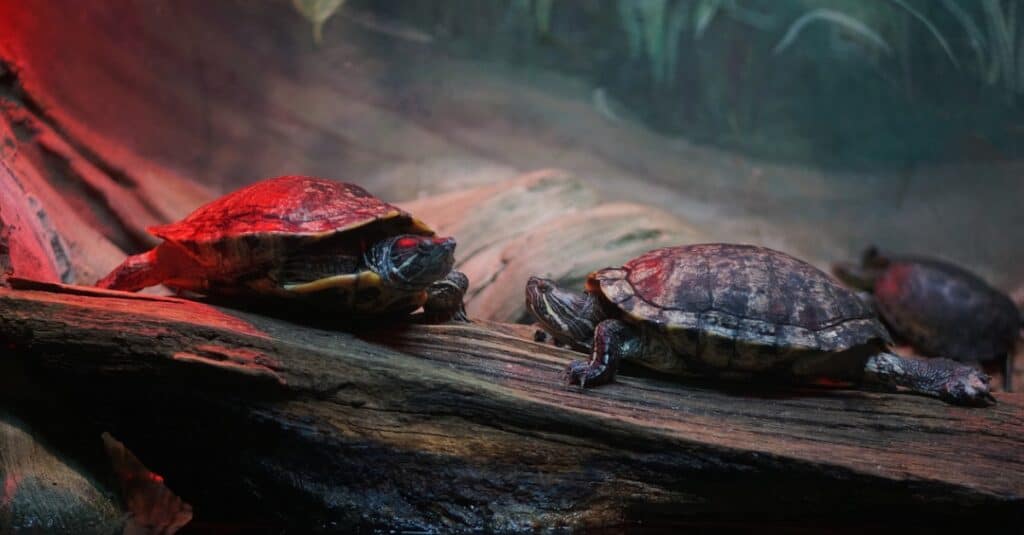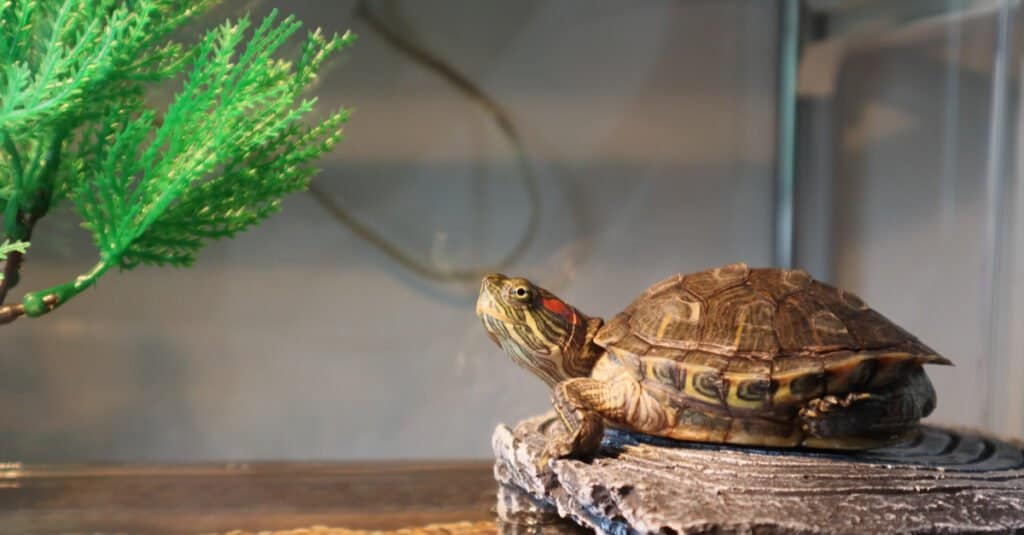Turtles are fascinating animals and can be great pets for the experienced reptile enthusiast. However, they certainly aren’t for everyone, and it’s worth taking the time to consider whether one is the right pet for you. Below, we’ll take a look at eight reasons why you might want to avoid getting a pet turtle, or at least reconsider your options for a new pet.
1. Turtles Have LONG Lifespans

Even small pond slider turtles can live for more than three decades!
©YKD/iStock via Getty Images
As far as pets go, turtles enjoy the longest lifespans of them all (aside from certain types of parrots). Even pond sliders, which are among the most popular turtle species as pets, can live for around 30 years or more! And that’s on the lower end of the spectrum–many tortoises can live upwards of 80 years, such as the popular Sulcata tortoise.
2. Vet Care For Reptiles is Expensive

All pets need veterinary care at some point in their lives, even turtles.
©Gorodenkoff/Shutterstock.com
Veterinary care for any pet can be costly, but this is especially true for pet reptiles like turtles. That, of course, is assuming you’re even lucky enough to have a veterinarian that specializes in reptiles near you, as they are generally few and far-between.
To put things into perspective, even a routine check-up appointment for your pet turtle can cost anywhere from $50 to well over $200. This, again, depends on your reptile veterinarian’s prices. If your turtle needs medications, surgeries, or some type of imaging or other diagnostic testing, you can expect further costs to be anywhere from hundreds to several thousands of dollars for a single appointment.
Additionally, emergency vet care can be particularly costly. This is because emergency vet offices are costly to operate, and emergency medications and treatments for turtles can be hard to source and very pricey due to their scarcity. Furthermore, emergency veterinarians must be on-call at all hours, and their labor is highly specialized and valuable.
3. Risk of Salmonella

Reptiles like turtles can carry salmonella. Cleanliness when handling or cleaning enclosures is an essential part of turtle care.
©nobeastsofierce/Shutterstock.com
Turtles can carry the risk of salmonella, making them an unsafe pet choice for very small children who are prone to putting anything and everything into their mouths. Even adults who aren’t knowledgeable about adequate reptile care can become seriously ill if they do not properly sanitize their hands after handling their pet turtles. Additionally, dogs can contract and become ill with salmonella.
To be clear, if you have small children and/or don’t want to bother with having to carefully clean every surface in your pet turtle’s enclosure and sanitizing your hands every single time you hang out with your adorable hard-shelled friend, you might want to avoid bringing one into your home.
4. Turtles Need a LOT of Enclosure Space

Turtles require elaborate enclosures with plenty of space, heating, and lighting.
©iStock.com/:Marina Vedernikova
Like most pet reptiles, turtles require far more space than most pet owners would initially think. In general, you’re not going to be able to get away with putting your pet turtle in a simple 20 gallon enclosure from your local pet shop. Even most smaller turtle species require upwards of 50 to 100 gallons of space to truly thrive, with larger varieties needing expansive, sprawling indoor/outdoor enclosures and even large, clean pools of water to soak in from time to time.
If you aren’t able to provide your pet turtle with enough space to feel comfortable, it’s probably best to avoid adopting one.
5. Turtles Can Be Messy

Turtles can be messy, and their enclosures need regular, consistent cleanings for them to thrive.
©Mark Leung/Shutterstock.com
Pet turtles can be quite messy to clean up after. This is particularly true for larger varieties, as well as aquatic turtles that need to be housed in aquariums with fresh, filtered, temperature-controlled water. In some cases, you may need to clean your turtle’s enclosure daily or even spot clean it multiple times per day.
On top of needing to keep your hands and surfaces in your home extra-clean to avoid the risk of salmonella, cleaning up after a turtle can be time-consuming and costly. If you aren’t able to commit to being able to regularly clean your pet turtle’s enclosure space, you may need to avoid or reconsider bringing one home.
6. Food, Daily Maintenance, Etc. For Turtles is Expensive

Most varieties of turtles need fresh food daily, either in the form of fresh fruits and veggies, live feeder insects, or both.
©_jure/iStock via Getty Images
Most pet owners know caring for their pets incurs lots of extra costs for daily upkeep and food. However, many don’t fully grasp the totality of the costs until they’ve already adopted their pet. Like most pet reptiles, turtles need fresh food daily, as well as additional care needs like heating and UVB lamps and enclosure necessities. Heating and UVB bulbs can be especially costly, as you will need to replace them often.
Fresh food can be expensive regardless of whether your pet turtle’s diet is herbivorous, omnivorous, or carnivorous. Buying fresh fruits and veggies daily adds up very quickly, as well as buying feeder insects like crickets or worms. Consider this very carefully and make sure you have every daily maintenance cost accounted for before bringing a pet turtle into your home.
7. Turtles Can Be Escape Artists

Some tortoises are skilled at digging and burrowing, meaning they need sturdy enclosures to keep them from digging their way out.
©reptiles4all/Shutterstock.com
Did you know many types of turtles are experts at digging, burrowing, and even climbing? Depending on the type of turtle you want to adopt, you’ll need a very secure enclosure to make sure they don’t escape. This means having tall fences that actually go into the ground several inches or even feet. Additionally, you’ll need to ensure the enclosure’s borders are tall enough to prevent them climbing or tipping over and injuring themselves in their escape attempts.
Another helpful tip is to install security cameras that connect to your phone so you can check in on them even when you’re away from home, working, or running errands. Like we touched on above, you won’t be able to simply plop your turtle into a 20 gallon enclosure from a pet shop. If you can’t commit to constructing a spacious and secure enclosure for your pet turtle, it might be best to avoid bringing one home.
8. Turtles Are Illegal in Some States

In some states, the sale of turtles and tortoises is illegal.
©Hemant Singh/Shutterstock.com
Depending on where you live, it might be illegal for you to even purchase a pet turtle. According to the CDC, eighteen US states ban the sale of most small turtle species, including California, Illinois, New York, and Washington. Furthermore, two states outright ban the sale of all turtles in general (North Carolina and South Dakota).
In short, if you’re planning on adopting a turtle, make sure you thoroughly research their legal status in your state before buying one.
The photo featured at the top of this post is © Elina Leonova/Shutterstock.com
Thank you for reading! Have some feedback for us? Contact the AZ Animals editorial team.







